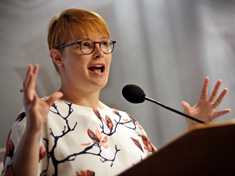-
Alix Bacon on Building a Global Community of Midwives
July 29, 2016 By Sean Peoples
The fourth global Women Deliver conference in May brought nearly 6,000 experts and advocates to Copenhagen to address the health and rights of women and girls, including a small group of young midwives who attended a symposium beforehand. “I went in a little bit skeptical,” says Alix Bacon, president of the Midwives Association of British Columbia and one of 32 women under 35 who received a scholarship to attend, in this week’s podcast. “And I came home a changed woman and a believer.”
The fourth global Women Deliver conference in May brought nearly 6,000 experts and advocates to Copenhagen to address the health and rights of women and girls, including a small group of young midwives who attended a symposium beforehand. “I went in a little bit skeptical,” says Alix Bacon, president of the Midwives Association of British Columbia and one of 32 women under 35 who received a scholarship to attend, in this week’s podcast. “And I came home a changed woman and a believer.”
Bacon said the ability to escape the immediacy of the day-to-day clinical requirements of midwifery and think about how they can grow as a network was invaluable. “There isn’t an advocacy component to your midwifery training,” she says, “And this is where the midwifery symposium really shined. It addressed our weaknesses, regulation, research, policy.”
In the context of regulation and public funding, midwifery in Canada is relatively new, Bacon says, which puts them in a unique position among wealthy countries to partner with developing countries facing some of the same challenges. They have developed a 30-year roadmap from “zero to functional that we can share with our partners,” for example, she says.
One such partnership is with South Sudan and the United Nations Population Fund (UNFPA). The “twinning” project matches midwives together with the aim of increasing capacity, “supporting a strengthened, enabled environment for gender-sensitive maternity care.” Partnerships like this are crucial for the world’s newest country, which has among the world’s highest maternal, newborn, and child mortality rates. “Only 15 percent of births are attended by a skilled birth attendant,” Bacon says.
Renewed violence and mass displacement has “had wide-reaching effects on our ability to implement this project,” she says. They had to pull Canadian staff out of the country in June, but Bacon still believes in the promise of the partnership. “It’s about positioning midwives as experts in maternity care,” she says. “And when you’re positioned as an expert and supported by the ideal partner, you grab the attention of policymakers locally.”
With a global standard of education and the proper policies in place, “midwives can meet 87 percent of the needs of women and children,” says Bacon. “We also happen to be terribly cost-effective, which really makes us a best buy when it comes to maternal, newborn, [and] child health.”
Alix Bacon spoke at the Wilson Center on July 18, 2016.
Friday Podcasts are also available for download on iTunes and Google Podcasts.
Sources: Al Jazeera, Global Affairs Canada.
Topics: Africa, Canada, cooperation, development, Dot-Mom, Friday Podcasts, global health, maternal health, midwives, South Sudan, UNFPA, Women Deliver, youth
 A Publication of the Stimson Center.
A Publication of the Stimson Center.




